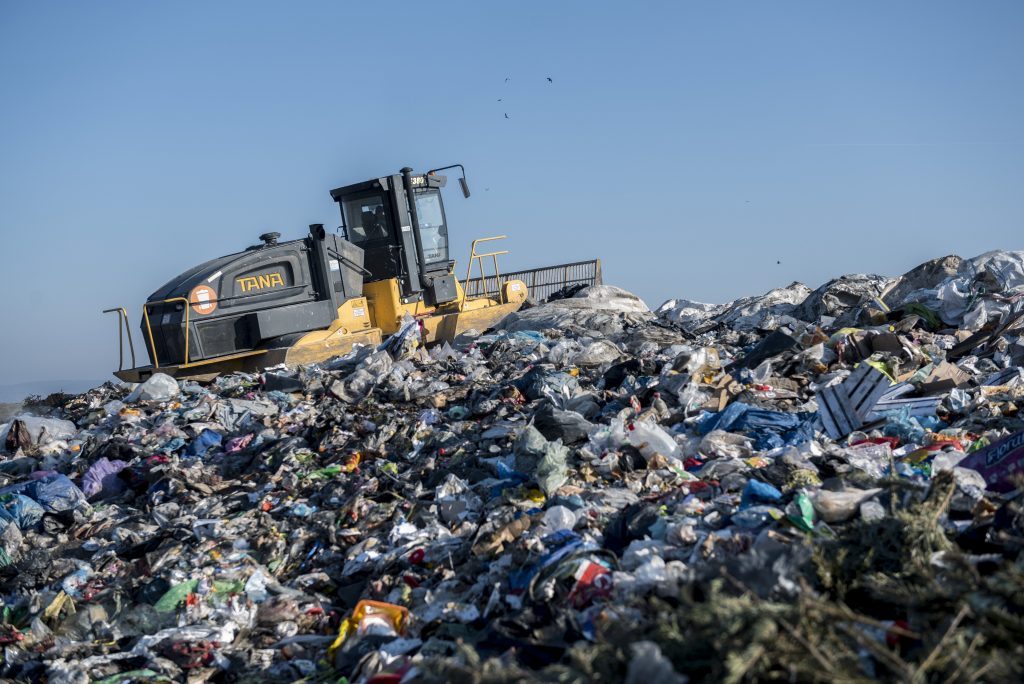The https://english.atlatszo.hu use cookies to track and profile customers such as action tags and pixel tracking on our website to assist our marketing. On our website we use technical, analytical, marketing and preference cookies. These are necessary for our site to work properly and to give us inforamation about how our site is used. See Cookies Policy
Leaked ministerial proposal recommends nationalization and concession of waste management in Hungary
According to a ministerial proposal which was leaked to Atlatszo, waste management would eventually become an exclusively central-government controlled practice in Hungary. Once taken from local governments or municipalities, the new scheme would be based on concession agreements with “trustable waste contractors”. According to the proposal, private ventures could apply for 15 year-long contracts without participating in public tenders. The document recognises the complete failure of previous reforms, indicating that the stabilization of the sector will cost a considerable amount of taxpayers money.

The draft proposal was authoredhull by the Ministry of Innovation and Technology, lead by László Palkovics in May. As the document is yet to be discussed officially, it is important to state that it cannot be considered as the official standpoint of the Hungarian government. Nonetheless, the 46-page-long document recommends the rights of waste management transfer into government holding, which would be followed by the establishment of a concession-based system with the involvement of private corporations.
Attempts to reform the waste management sector in Hungary were started in 2011, when waste collection was re-organised by local governments with the involvement of non-profit service providers. Later on, a newly-introduced government policy, aiming at the general decrease of household expenses, dealt serious blows to the work of the above mentioned providers. In 2016, the sector was reallocated under a centralised company (NHKV, National Waste Management Ltd.), which was entrusted with the collection and local-reallocation of different maintenance fees.
Still, the NHKV could not sustain waste management on the desired level and various cases were reported on belated or missed payments to the locally-commissioned waste management firms. Eventually, this resulted in a situation, where local firms refused to take away communal waste.
Stench, fire, flies & rats – billions of forints disappearing from waste facility near Balatonfűzfő
After one hot summer day, residents of Balatonfűzfő would open their windows to ventilate their homes, but instead of the cool, fresh air, they only feel a stench of rotten garbage. Having an evening barbecue in the garden or eating dinner on the balcony has become impossible.
According to the leaked proposal, as the practice of waste-management becomes the monopoly of the central government, the authority would be taken from the hands of local governments. Besides the essential public services, the planned concession-based system would also include more profit-oriented practices, since the waste collection of the non-public sector is already organised by a market-based plan. If the required regulations are implemented during the second half of 2020, the shift to the new plan could be completed by 2022. However, these changes would not affect the sum of the current fees paid by the public.
Today, general waste management in Hungary is a public service and it is a task shared by the government and the municipalities. As noted, the handling of non-general (such as industrial waste) is already managed by different private market actors. Since the handling of public waste is a less-than-profitable business, there is a considerable amount of profit in the non-public sector.
The leaked document states on many occasions that previous reforms not only failed to solve current problems of the sector, but created new ones. The money required to save the sector from bankruptcy is significantly more than what was previously required for its maintenance.
“The reforms of public waste management system did not produce any positive result, considering that the integrated data of public service providers and NHKV reports a total sum of HUF 18,9 billion loss in 2018, while before the implementation of government coordination, in 2015 it barely took up one billion.” – said the document.
It is also clear that the government is lacking financial resources to reach the target goals in waste management set by the European Union, since the required developments would take up hundreds of billions of Forints. This is the reason why the proposal desires to involve a significant amount of private capital in the management of the sector besides the granted EU funds.
Lőrinc Mészáros’ starch factory polluted the water reservoir of the Mátra Power Plant
Visonta-based Viresol filed a lawsuit against Atlatszo when we first reported about their pollution in November, which caused toxic gas leakages at the Mátra Power Plant, where several workers became ill.
The first legal requirement for setting up a concession-based system is that the practices, which would eventually be granted concessions, must be branded as government-monopolised economic activities. The contractor of a granted concession must manage every task related to the field of the granted privilege. This de facto means that the scope of authority and the sphere of action would be taken away from local municipalities. This includes every available, previously local-government-owned equipment and facility.
„The most outrageous part of the plan is that the government would take away every waste-management-related equipment and facility from local authorities. This would mean a serious financial blow to every municipality” – an expert who asked to be unnamed told Atlatszo.
Since waste-management rights are defined on a geographical basis, a single concession grant could manage an entire county, or even more counties. As a result of this, the currently active, smaller firms of the sector would either have to choose between joining the concession granted corporations, or bankruptcy – explained the above-quoted expert.
Concessions could be acquired through official government tenders, or in the case of „a trustable waste contractor”, without participating in a public tender.
„Everyone is aiming to get ahold of industrial waste and, whilst the Mészáros-related entrepreneurs will invest in the most valuable parts of the sector, the least valuable public sector will remain in the hands of the government. It will be hard to find contractors for this, so it will be followed by the granting of support funds.” – stated the previously-quoted expert.
Mészáros Group acquires lucrative toxic waste processing site after the state renewed its permit
Environmental license of the Tatai Environmental Protection Ltd.’s hazardous waste processing plant at the Almásfüzitő red mud reservoirs was renewed in December 2019. Atlatszo reported earlier that the government-aligned Mészáros Group was in negotiations about the potential acquisition of the company before it was granted the new permit by state authorities.
Further below, the document reflects on two previously implemented analogies: the nationalisation of tobacco trade and gambling. It analyses the previous objections and eventual penalty fees implemented by the European Union. The usual case is that government-friendly entrepreneurs gain the most profit on government-related concession tenders.
Every successful contractor could expect a stable income. First, the amounts of profitable material is likely to increase, since a basic condition of the concession is the successful fulfilment of the required European Union goals. To achieve these goals within a sensible timespan, further investments and developments would be implemented by contractors. Furthermore, the income from the profitable materials is likely to increase as well. Especially considering that the proposition is pushing for the authorisation of an increased usage of recyclable materials in every product (such as plastic bottles) that is introduced on the Hungarian market.
Further funds would be relocated to the development of the planned waste-management system. By 2040, 400 to 600 billion Forints would be given to various developments of the sector, such as the construction of 3 to 6 waste incinerators, which cost 100 billion Forints per facility.
Carcinogenic soil and groundwater contamination at hazardous levels in Hidas and Garé
Now bankrupt chemical manufacturer company Budapesti Vegyiművek (Budapest Chemical Works, BCW) has been producing and packaging pesticides and insecticides since the 1960s in Hidas, Baranya County. Chlorobenzene derivatives were generated as a waste by-product from the manufacturing process, the hazardous waste was stored in 200-liter metal barrels near the factory.
The leaked document sets forth a number of important goals to be met by 2022:
- To minimize illegal dumping, inspections would be held more often;
- A new system would be introduced regarding the market-regulations and quality-inspections in order to correct flaws of both public and private fields of the sector;
- The setting up of a new bureau for the easier sanctioning of illegal dumping;
- The fee of waste-laying would increase as well, to make recycling more profitable than simply laying trash on waste yards;
- The seasonal municipal cleanups would disappear and, instead, free collection points and a ‘door-to-door’ clearance service ( 2-3 times annually) would be introduced.
We sent our questions to the Ministry of Innovation and Technology, but as of yet we have not received any comments.
Written by Szilvia Zsilák, translated by Zsombor Gál. You can read the more detailed Hungarian version of this article here. Photo credit: Tamás Sóki / MTI


